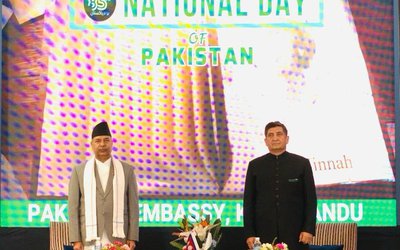
At a time when Nepal is in a desperate need of resources to implement the development projects related to basic needs of the people of Nepal, DFID, UK’s aid agency, has been offering all its support, Dominic O' Neill,Head of DFID Nepal, Kathmandu, spoke to New Spotlight on various issues. Excerpts:
How do you view DFID's support to Nepal?
In 2010, the UK Government prioritised Nepal, during the last strategic aid review, as one of 26 priority countries for UK development assistance. This means that DFID will be scaling up UK development assistance to Nepal from £60m to £100m per annum as of the 1st April 2013. As well as being an important sign of the strength of the Nepal / UK bilateral relationship that we will ensure that this leads to more development results and visible improvements to the lives of the poorest people in Nepal.
As one of the largest development partners of Nepal, what is your impression about the utilization of DFID's support to Nepal?
We are satisfied that our development assistance is being utilised well in Nepal. Undoubtedly there are challenges and frustrations as Nepal is a complex country with on-going political issues to be resolved and massive diversity in geography, ethnicity, wealth, and resources. We currently deliver one third of our bilateral development assistance through the Government of Nepal. This includes programmes such as the Nepal Peace Trust Fund, the sector support to Health and Education and the Local Governance and Community Development Programme. We have expressed concerns that utilization in some of these sectors has been lower this year due to the limited budget in 12/13 and we hope that will be resolved for 13/14 to ensure we can meet our disbursement targets and development results.
We also deliver development assistance through internationally contracted partners, in the same manner that other development partners like USAID do. We find this is effective when Government has limited capacity to deliver that cannot be strengthened quickly, but we always work hand in hand with Government partners and 100% of our projects and programmes receive approval from the Government of Nepal before they commence. In the future, we expect more of our programmes will be disbursed through Government’s own systems but this will be determined by the strength of Nepal’s public financial management and accountability systems which are currently hampered by the political situation.
As Nepal has been passing through a prolonged political instability with frequent change in the officials, how do you see the implications in the projects?
The rapid changeover of staff has serious consequences not just for our joint programmes with Government but for Government’s own programmes. You cannot expect to change senior staff every few months and not to see an impact. As in any government, senior staff like Secretaries and Joint -Secretaries need time to learn about a sector and to deliver reforms, improvements and results. With regular changeovers, the knowledge and momentum is lost. This is not just about senior staff in Kathmandu, I visited Humla recently where there have been four LDOs in 18 months. It is impossible for an LDO to make a difference in a hard to reach place like Humla if they are only in place for a matter of weeks.
What are the priority areas of DFID in Nepal?
DFID agreed its current Operational Plan with the Government of Nepal in 2010 and it has four priority areas: Inclusive Wealth Creation, Governance and Security, Service Delivery and Climate Change and Disaster Resilience.
As Nepal is one of the most vulnerable countries facing the challenges of climate change, how do you assess the programme supported by DFID?
We have seen that the impacts of climate change on communities are already evident in Nepal. Vulnerable and poor people, many of them women, are struggling to adapt to the effects of changing climate. By 2015, our programmes will increase climate resilience of 3 million poor people and 200,000 people will have access to clean energy. Activities supported by our programmes will be identified by communities and include work in agriculture, water, energy, forestry and disaster risk reduction.
DFID is one of the major development partners providing support to deal with climate change related issue. How do you see your assistance?
DFID is supporting Nepal Government’s initiatives on Climate Change both nationally and internationally. We have committed £45m to help Nepal address the impacts of climate change and improve livelihoods of poor people through forest management. This is part of UK Government’s £2.9bn of global climate funding commitment. The UK is also committed to support Nepal in international climate negotiations to achieve the ambitious, equitable, legally binding global deal.
Disaster Risk Reduction is one of the major priority projects of Nepal, how has DFID been supporting Nepal?
In 2011, DFID launched a major initiative to increase Nepal’s resilience to earthquakes and other natural disasters. We are strengthening government systems for disaster management and response, supporting community based disaster risk reduction activities and improving preparedness for a large scale emergency response. We are also funding the reconstruction of school buildings damaged during an earthquake in 2011 and designing a hospital retrofitting programme. We work through UNDP, the British Red Cross, Oxfam, Save the Children, Practical Action and Action Aid and the ICRC. All our support is closely coordinated with the government-led Nepal Risk Reduction Consortium.
DFID has been supporting Nepal in governance and security sector for long time. What is your impression about the project?
Improving the rule of law and security, reducing corruption and improving efficiency in the delivery of basic services is essential if Nepal is going to be able to achieve development and alleviate poverty . Since 2006, DFID Nepal has invested almost £20 million to support Nepal’s peace process, which helped to build and maintain the cantonments, supported the 2008 CA elections, and rebuilt over 95 police posts. Our ‘good governance’ programmes have been supporting action to transform institutions to make them more inclusive and accountable. We have also helped to set up more than 1000 women paralegal groups to tackle violence against women and girls. We are now looking to scale-up our work on security and justice even more through a new integrated justice sector programme so that poor and vulnerable people, including women and girls, have greater access to justice.
How are DFID's experiences in implementing the projects in the absence of local bodies like VDCs and DDCs?
There is no substitute for local elections and Nepal has no elected local government since 2002, this is now a major obstacle to good governance and effective development in Nepal. We continue to advocate for local elections at the earliest possible opportunity.
In the meantime, we have been helping poor citizens to secure a greater choice and control over their development outcomes. To date, 34,720 ward citizen forums (WCFs) - an inclusive 25 member group - with 97.5% coverage in the country have been formed through our support to the national local governance programme. Almost 2 out of 3 projects funded by local governments are prioritized by WCFs. This is an excellent indicator of local government responsiveness that will be enhanced further by having locally elected bodies.
Thanks to the contribution of Nepal's development partners like DFID, Nepal has made quite a good progress in MDGs. Given Nepal's current political situation, how do you see the possibility to sustain the achievement?
While Nepal’s development partners, NGOs and private sector have made important contributions to Nepal’s progress on the MDGs, most of the resources and expertise have been provided by the Government of Nepal itself and this is where the main credit should rest. Since the end of the conflict, successive governments have shown their commitment to health and education needs of poor Nepalis by increasing budgets for health, education and clean water. The political situation now threatens future progress. For example, the ordinance health budget this year is 38% lower in real terms than three years ago. We have urged the Government to find a way to prevent a collapse in development outcomes as a result of the limited the budget. In addition, there is an increasingly urgent need for Nepal to tackle gender inequality and violence against women, without which further progress cannot be made.
- NEPAL-THAILAND: Joint Business Council
- Apr 13, 2025
- BIMSTEC SUMMIT: Nepal’s Stand
- Apr 11, 2025
- IME GROUP: Expands Into Paper Industry
- Mar 24, 2025
- CPN UML: Instigated By India
- Mar 23, 2025
- ADB’S CHIEF ECONOMIST: Nepal Reduces Poverty
- Mar 11, 2025















